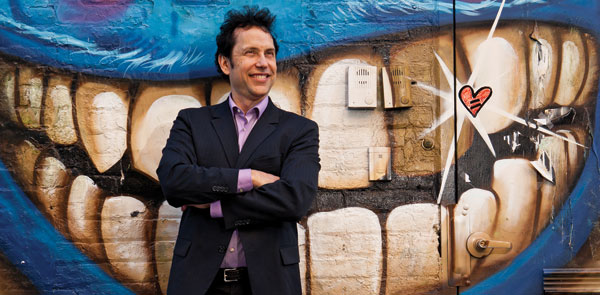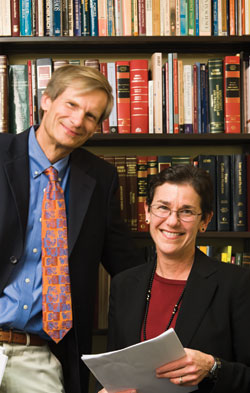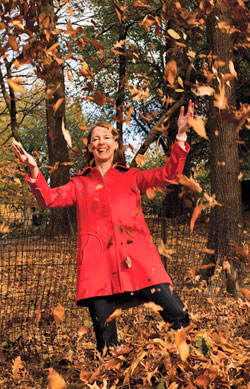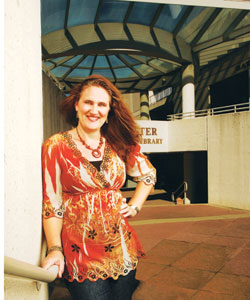Hunting Happy: In Grim Times, a Search for Joy in Law Practice Gains Ground

Michael Melcher: “Career change is half intention, half serendipity.” Photo by Sara Stathas
Today, Gretchen Rubin is happy. But back when she was a lawyer clerking for U.S. Supreme Court Justice Sandra Day O’Connor, she had a nagging feeling that the career she had worked so hard to build might not be her true calling.
Her co-workers devoured the law: They’d linger over lunch to analyze cases; they collected and read law journals as a hobby. That just wasn’t Rubin. Sure, she did an excellent job; but once she was done, she was done.
Then late one night, as she pored over the copious notes she was taking, for fun, on the life of Winston Churchill, it occurred to Rubin that some people took notes and wrote books for a living.
That’s when it hit her: She wanted what she did for fun to be the same thing she did for work.
In the years that followed, Rubin has written several books, including a Churchill biography and the wildly successful The Happiness Project, which documented her yearlong attempt to cultivate joy.
But the lesson she draws from her career shift isn’t simply that she had to leave the law to find satisfaction. She thought about her own happiness, and then she actively pursued it. That’s what a growing number of attorneys are doing, often without leaving the profession.
It’s a funny thing that’s happened among lawyers lately: Happiness has become hip.
This might seem strange for a profession that’s earned a reputation for almost pathological misery. A 2007 study by the University of Chicago shows that fewer than half of lawyers describe themselves as “very happy.” And, in at least two polls from the 1990s, a majority of lawyers say they wouldn’t choose the same career if they could start over.
Some say the suffering is exaggerated. But whatever its level, the notorious discontent is giving way to a growing movement fueled by scientific research, a new generation that prioritizes life quality, and a recession that highlighted the costs of professional disenchantment. What seems key is avoiding “drift,” zigzagging a career path and finding passion in the law.

Doug Linder and Nancy Levit: “Lawyers who work with small firms or in the public sector tend to be happier.” Photo by Nick Vedros.
LIQUID JOY
“Happiness is in the water these days. Clearly people are thinking about it,” says University of Missouri-Kansas City law professor Douglas O. Linder, who co-authored The Happy Lawyer: Making a Good Life in the Law. “There’s been a long-term trend toward greater emphasis on leading a satisfying life versus huge amounts of income.”
Evidence of the movement is everywhere, from law firm initiatives aimed at improving quality of life to the growing interest in collaborative law, which seeks to resolve disputes in less adversarial ways. The University of Missouri-Kansas City offered a course last year titled “The Quest for a Satisfying Career in the Law.” And in 2007, students at Stanford and other law schools formed Law Students Building a Better Legal Profession, a grassroots group that publicizes law firm data on billable hours and diversity.
Last spring, Rubin drew 75 lawyers when she spoke on finding happiness in the law at a presentation for the consulting group Flex-Time Lawyers in New York City. Lawyers are even studying happiness itself. Legal scholars Eric A. Posner and Cass R. Sunstein edited a book of essays, Law & Happiness, which examines the topic from a variety of legal angles, including the relationship between taxation and happiness and how the fear of crime affects perceptions of happiness.
This interest in happiness, of course, isn’t unique to the legal profession. Hedonics—the study of pleasure and happiness—is a burgeoning academic field; professors across a broad range of disciplines, including economics and psychology, are publishing on the topic. Economists from the University of Pennsylvania’s Wharton School garnered media attention a few years back with their study The Paradox of Declining Female Happiness, which asserted that women have become less happy, both absolutely and relative to men. And Rubin’s book underscored the topic’s mass-market appeal when it skyrocketed to the top of the New York Times best-seller list last year.
But the spread of the happiness movement into legal circles holds a particular significance because it has sparked a conversation about pivotal aspects of the profession.
“Lawyers have long been unhappy in some respects, but it was considered unprofessional to admit it,” says Linder’s co-author, Nancy Levit, also a law professor at the University of Missouri-Kansas City. She notes the traditional markers of success have suggested happiness is tied to high income: “It’s the most pernicious myth about lawyers: If you earn a high income, you will be happy.”
But after a certain point that simply isn’t the case—and many aspects of big-firm practice demonstrably reduce happiness, including rigorous billable-hour requirements, technology that allows work to infringe on personal time and high levels of stress.
“The myth is that absolute income will matter to your happiness, but it doesn’t seem to matter to lawyer satisfaction after $75,000,” Levit says. “Relative income matters more—how they compare to people whom they perceive to be peers.” (See Levit’s “Myths About Happy Lawyers.”)
But both individual attorneys and law firms are starting to recognize this truth, in part because the recession highlighted the value of work-life balance by temporarily restoring it for many lawyers, Linder says. The recession also prompted more lawyers to take control and focus on finding resources that will help them build a more satisfying career, experts say.
“With the latest recession, people realize that whether their career is going well or poorly, there may be resources out there to help them,” says New York City lawyer and career coach Michael Melcher, 47, author of The Creative Lawyer, which was published by the ABA in 2007. “Even people not in danger of losing jobs have woken up [and realized they] need to have a plan here, take responsibility for this.”
The happiness movement has meant more people, including lawyers, have become open to looking for help or advice. Coaching and professional development in “soft skills” such as leadership and management have become more common, says Melcher, who coaches lawyers and executives and has worked with major law firms.
He says there is also a growing awareness that it isn’t so much the profession of law itself that makes lawyers unhappy.
“Law doesn’t constrain people’s potential. … It may constrain their way of thinking about their potential,” Melcher says. “If you take an issue-spotting approach to your life, you will systematically cut off your possi bilities. Most possibilities are just inklings at the start—and you need to be able to support and let them flourish, but not analyze them to death.”
SO WHO IS HAPPIER?
Which brings us to one big question: Exactly how unhappy are lawyers anyway?
Compared with other occupations, lawyers are actually slightly above average: happier than roofers, gas station attendants or kitchen workers, but not as happy as members of the clergy, architects, airline pilots or butlers, according to the 2007 University of Chicago study, which looked at more than 190 occupations.
Big law firms aren’t exactly desperate for hires, the Happy Lawyer authors note, but they do have high attrition rates. The most recent NALP Foundation study on associate attrition shows that in firms with more than 500 attorneys, more than half depart within three years.
Data also shows that lawyers suffer high rates of alcoholism, depression and suicide. However, it is hard to say what this tells us about professional satisfaction because depression and unhappiness are two different things, Levit and Linder say.
To a certain extent the “lawyer personality” may play a role in overall happiness: Attorneys are a bit self-selected for introversion and are probably more pessimistic than the general population, Linder says. After all, he says, it’s good to think about worst-case scenarios when you’re writing contracts.
But, as a group, are lawyers unhappy? It’s still hard to say.
What Levit and Linder can quantify is the happiness disparity among different types of lawyers: Those who work at smaller firms or in the public sector tend to be happier, as do those who are older than 50 or work reduced hours. The least happy are those in large firms, where only 44 percent report they are satisfied.
In small firms there’s more of an “ability to develop trust, and trust develops over time,” Linder says. “If firms are large, you don’t have repeated interaction, don’t have ability to build trust. Work-life balance is more of an issue in large firms, too.”
But that isn’t to say that big-firm life is inherently miserable. The larger issue for many attorneys comes down to a mismatch: The realities of their law practices simply don’t fit their values, their temperament or the expectations they had as law students.
Too many lawyers have chosen an area of law, a type of firm—or even the profession itself—for the wrong reasons, experts say.

Gretchen Rubin: “For any career trajectory, the further you go down, the harder it is to switch. … It feels like a big leap.” Photo by Sara Stathas.
That’s what happened with Rubin, 45, who says she became a lawyer because she “couldn’t think of anything better to do.” Her dad was a happy lawyer, and she’d done well as an English major at Yale; she figured law school made sense. So she enrolled at Yale Law School, where she continued to excel, eventually becoming editor-in-chief of the Yale Law Journal.
But looking back, she says she wasn’t actively happy; she was “drifting.”
“The thing about law school is that it is a default position for many people. … If everyone went to sound engineering school, some would be happy, some would not—but not a lot of people are randomly going,” Rubin says. “But a lot go to law school that way.
“When you make a decision without deciding, when you go along with what others do, you drift. It sounds easy, but it’s the passive, lazy choice. [Law school] can be grueling; law school is hard every step of the way. It doesn’t mean you’re not drifting, and [people] can be fooled by that.”
Even those who are initially passionate about careers in law can veer off track, pursuing specialties that don’t match their values or dreams, and that subsequently fail to deliver job satisfaction.
“When students come into law school, about two-thirds express interest in public interest. When they get out, fewer than one-third go to public interest kind of jobs,” Levit says. “Is law school changing this ideal of success? Are folks buying into it? That is a concern.”
THE MONEY TRAP
When Houston lawyer Lori Twomey graduated from law school in 2002, she bought into those traditional notions of success—at first.
It was understandable: She’d graduated in the top 10 percent of her class at the University of Houston Law Center and was in a position to land a job at a big law firm, so that’s what she did. She went to work as a civil litigator for a large regional firm in Houston, one with a couple hundred attorneys, long hours and high pay.
But the week she started, she found out she was pregnant with her first child. The baby was 6 months old when Twomey, reprieved from a trial date in Dallas when the case was delayed, realized she had a big decision to make: Sweat out balancing motherhood with work at a big firm or find another path.
She realized right then that she didn’t want to get stuck in a job that didn’t fit the shape her life was taking, so she found one that did, even though it meant earning less money. She moved to a seven-person firm and negotiated a pay structure that gave her control over her hours.
“As soon as you become a slave to a high salary,” says Twomey, 36, “you have to work the long hours [because] they have to recoup money from you. If you live below your means, if you don’t buy the house or new car, you open options to find alternative paths.”
When she gave her notice, the big firm—which had originally told her she couldn’t scale back her hours—offered an alternative schedule. But Twomey followed her gut.
“I knew for my happiness I needed to be someplace where they were happy and wanted me there with that alternative arrangement, not just [because they were] trying to keep me,” Twomey says.
Her instincts paid off, but as her life continued to evolve, Twomey knew she had to keep listening and readjusting. At one point, she jumped at a sideline gig teaching pretrial advocacy as an adjunct professor at her alma mater.
“It was pathetic pay, not a smart financial decision, but probably the best decision I ever made,” she says.

Lori Twomey: “As soon as you become a slave to a high salary, you have to work the long hours.” Photo by Pam Francis.
When her second child was 4 months old, she left her small firm and joined the law school faculty full time. Eventually she and a partner also developed an appellate specialty practice on the side. “I love appellate briefing,” she says. “I love doing the oral arguments.”
Now, through careful fine-tuning, Twomey’s work life includes all the things that inspire her passion, and she still has the flexibility to pick the kids up from school and get them to swim practice and gymnastics.
“I can’t imagine doing anything else,” Twomey says. “In fact, my father is considering retirement right now, and we were having a long conversation about retirement. And I told him at this point, I could not imagine retiring. I really love what I’m doing, and I can see doing it until I can’t do it anymore.”
The lessons she’s learned about pursuing happiness are ones she tries to share with her students.
“If they say they don’t know if they’re really cut out for a career in law, I ask what their motivation is,” Twomey says. “If money is the motivator, you will burn out in law. If you are passionate about the intellectual pursuit or about helping people who have been wronged, if you find something you are passionate about—that’s what will take you through.”
LOVE AND LAW
This is the key to finding a happy life in the law, the experts say: Do what you love.
“Love makes us happier than anything,” Levit and Linder write in The Happy Lawyer. “We generally think of love as it relates to our feelings for another human being, but it is also possible to love your job, to pay attention to your work, and respect its traditions and noble goals.
“Like any marriage, your relationship with your work will have its tensions. There may be days when you wish you were doing something else. But as long as your work holds your attention, there’s more than just hope for being a happy lawyer.”
To do this, Levit and Linder tell lawyers to find work that interests them, align their work with their values, balance their work with the rest of their lives, and deepen their workplace relationships.
Ideally, this starts in law school; and the professors hope to see more institutions encouraging students to rely on internal measures of success, to identify their strengths and interests, and to think about how these factors can lead to a more satisfying career.
“Law schools need to do a better job about making practice expectation match reality,” Linder says. “Students from top law schools are least happy. [They’ve] gone through law school and undergrad, and achieved success after success, [and they] feel entitled to a job that provides day after day of satisfaction.
“Jobs aren’t like that,” Linder notes. Those students “tend to be more disappointed than students out of second-, third- or fourth-tiers. … Also, of course, career paths at top law schools lead into positions where work-life balance is a big concern.”
In their weeklong happiness class, Levit and Linder encourage students to actively consider the factors that will boost career satisfaction by examining studies from the fields of neuroscience and psychology, as well as mapping out their strengths and goals.
After taking the class, Jennifer Dougan, 39, found herself tweaking her career plans.
“This class really got my wheels turning about what really is going to make me happy,” says Dougan, who graduated from the University of Missouri-Kansas City School of Law in 2010 and has a solo practice in general business law in Kansas City, Mo. “When I took this class, I thought I’d work for a small firm initially and then go solo. And after really, really contemplating it, [I realized] I don’t really want to work for someone else right out of school. This class was really the impetus for me heading in that direction.”
For Leo O. Salinger, 28, a former student who now practices real estate and development law at Husch Blackwell in Kansas City, the class confirmed that he’d chosen a firm and area of law that would keep him motivated and happy.
“It’s not often that you’re going to sit in a classroom and be able to focus on something that’s going to be so important to you not only in law school but down the road in your practice,” says Salinger. “I think one thing I took away is that within each and every practice area—be it litigation, real estate, corporate, whatever you’re doing—there’s opportunities out there to find what you really enjoy and thrive at doing.”
But as the happiness movement takes hold, some firms are promoting more social interaction, creating pro bono programs and simply being more playful. Chicago-based boutique Bartlit Beck Herman Palenchar & Scott even has a half basketball court that doubles as a conference room, a feature in place since shortly after the firm opened in 1993.
“It’s a relaxed setting that … inspires more creativity and teamwork,” says partner Hamilton Hill, 35, who was walking on the treadmill desk in his Chicago office as he spoke. “It’s not a bunch of people rigidly sitting there.”
The firm, which has nearly 70 attorneys in Chicago and Denver, has cultivated this environment, an effort that also includes not using the billable-hour model. And Hill—who asserts he is “absolutely” happy practicing law—says that this allows him to enjoy all the “wonderful and great” parts of his profession.
“What we’ve tried to do is strip away a lot of the bad things about being a lawyer,” he says.
SMALL STEPS, BIG GAIN
In some respects, the happiness movement encourages big changes, but it also embraces the small steps that can make a big difference in personal happiness. Making a change to build a more satisfying law career isn’t necessarily an all-or-nothing proposition.
Sometimes finding happiness in law means tweaking the career path, remaining open to new possibilities and taking a positive approach. Which is where Melcher’s “don’t blame the profession” point comes in.
Often people who are unhappy or stuck “relate to each other by sharing how stuck and how unhappy they feel. This is not a useful way to move forward,” says Melcher, adding that he doesn’t read lawyer blogs because they are “generally so negative.”
So try some positives:
• Scale back the blame and focus on making the right adjustments; this is the key to finding the happiest fit. “You have to know who you really are and what’s important to you,” Melcher says.
• Look at your core competencies, what you’re really good at, he says. Then consider your future vision and think about what kind of life you’re trying to create.
• Get out and interact with people who can help you answer these questions and, perhaps, help lead you to the right place. People you don’t know well are often the most useful in career change because they’re not invested in you, he says.
Don’t expect immediate results, Melcher says. Finding a happy fit takes time.
“You need to understand that it’s a zigzag, not a straight line,” Melcher adds. “Career change is half intention, half serendipity.”
For Rubin, the movement toward happiness began when she finally started listening to herself. It was an act so simple, yet so crucial, that when she started the happiness project that became the basis for her recent best-seller, her first of “12 Commandments” was: “Be Gretchen.”
“What happens with lots of lawyers, they want to do something different, but they don’t know what,” she says.
“My desire to become a writer became so strong that it became irresistible. Once I said that I wanted to write a book, I had to try. I would rather have tried and failed than not to have tried.”
That didn’t mean it was always easy.
“It was hard to start over. Nobody [in publishing] cared that I clerked for Justice O’Connor. … Other than that it was impressive, it was not directly helping,” Rubin says. “For any career trajectory, the further you go down, the harder it is to switch. … It feels like a big leap.”
But Rubin was lucky: When she made her big switch, she had the support of family, friends—and even the former Supreme Court justice.
“When I talked to her last, [O’Connor] said, “I’ll tell you what the recipe is for a happy life. Work worth doing is the recipe for a happy life.’ “
“She said everyone should do what they want.”
Becky Beaupre Gillespie is a Chicago-based journalist who writes on issues of work-life balance. Hollee Schwartz Temple directs the legal writing program at West Virginia University College of Law. Their forthcoming book, “Good Enough Is the New Perfect: Finding Happiness and Success in Modern Motherhood,” will be published in April.



